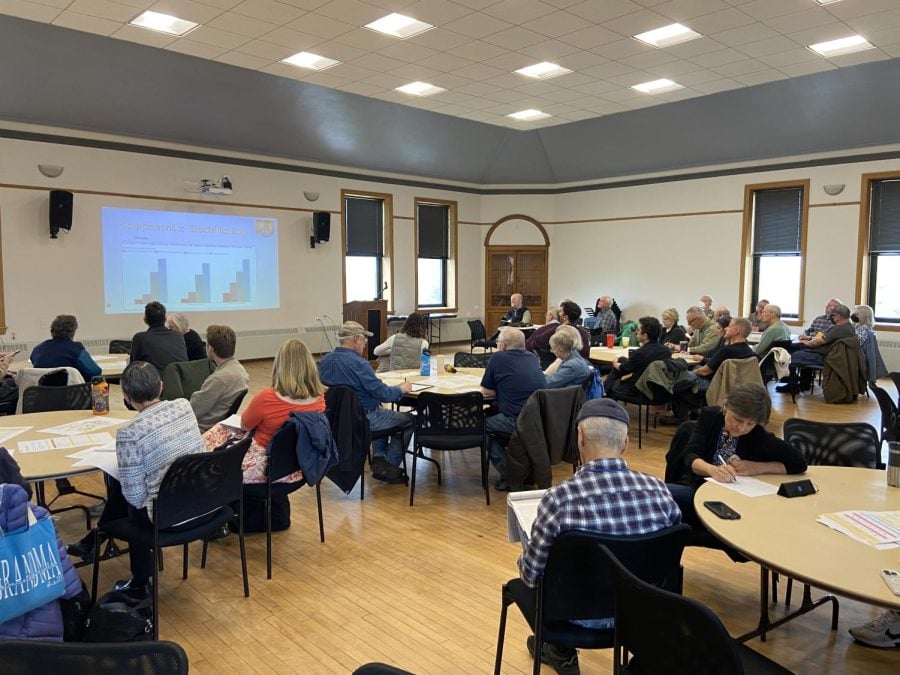Residents, local activists convene to discuss climate-friendly home improvements
Cole Reynolds/The Daily Northwestern
Residents and local climate activists convene to learn and discuss ways for individuals to sustainably improve their homes.
April 30, 2023
Local climate groups and the city hosted a gathering Saturday morning about educating people on renewable energy in their homes. The event spotlighted individual actions instead of government initiatives.
As Evanston pursues climate projects like an energy-efficient animal shelter, Saturday’s gathering focused on smaller-scale improvements, from replacing stoves and heating units to installing home solar panels. There, climate experts presented ways for every Evanston home to become more sustainable and affordable.
“These kinds of actions are both good for the earth and good for the consumer,” said Scott Allen, environmental outreach coordinator of Citizens Utility Board, during a presentation at the event.
Four years into implementing its Climate Action and Resiliency Plan, Evanston has reduced its carbon emissions by 38% from 2005 levels, according to the city’s Sustainability and Resilience Manager Cara Pratt. But she said there is more to those numbers than meets the eye.
Pratt said a significant amount of that reduction is due to renewable energy credits, where the city purchases credit for surplus climate improvements made in other areas. Evanston’s use of natural gas, she said, has barely deviated from its original starting point.
“From 20 years (ago), we’ve made no real progress in reducing our emissions from natural gas,” Pratt said.
Many of the home sustainability improvements presented by Allen focused on reducing use of natural gas in residential properties. Allen suggested replacing gas ranges with induction cooktops, as well as using geothermal or air-source heat pumps instead of gas-powered ones.
With national tax credits for sustainable improvements already available and national rebates from the Inflation Reduction Act on the horizon, Allen said Evanston homeowners are entering the best time to make home improvements. For example, he said a group created by CUB estimates a homeowner could pay just $13,000 on a $30,000 geothermal heat pump if they use tax credits and rebates.
The problem, presenters said, is the various credits and rebates can be confusing to access and compile.
“We’re in danger of leaving people behind in this transition,” Allen said.
Pratt said the event was part of the city’s strategy to educate people about home improvements and generate ideas for that strategy. Organizers asked attendees to gather in small groups and brainstorm ideas for better outreach.
Since rebates likely won’t be available until spring 2024, attendees and presenters alike said this year is a chance for residents to plan improvements ahead of time.
“The time to make these choices is not under duress when your heating goes out but it’s zero degrees, or when it’s 95 degrees and the air conditioning doesn’t work,” said Joel Freeman, who helped facilitate the event. “The idea of turning this into a planning process — kind of a strategic plan for yourself — is a key element.”
Many attendees agreed the lack of information on building sustainable infrastructure was at least in part to blame for the slow progress in reducing carbon emissions.
Osh Nissan, an owner of a local sustainable contracting firm, said many contractors are unfamiliar with energy-efficient technologies and hesitant to install them, a point echoed by others in the crowd. And for homeowners, information on appliance upgrades and climate improvements needs to be “streamlined” from the city, another attendee said.
Jack Jordan (Weinberg ’22), an energy analyst at Invenergy, suggested the city send each house a survey on their appliances. With the data collected, he said, Evanston could develop customized improvements for each house as a “Home Strategic Plan.”
“I think that’s a really good way to communicate all these opportunities to homeowners,” Jordan said, “Just physically say, ‘Here, we will help them come up with a plan.’”
Email: [email protected]
Twitter: @charcole27
Related Stories:
— Local activism plays key role in Evanston’s climate leadership, student thesis shows
— Citizens’ Greener Evanston changes name to Climate Action Evanston
— Evanston climate community reconnects, plans for future together


